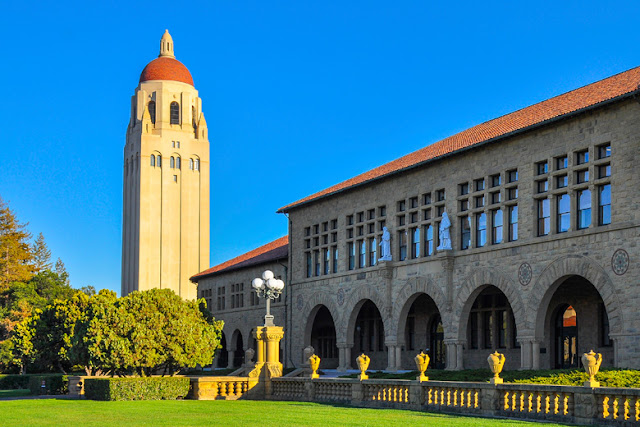Top 5 US Colleges in The World
Contemplating considering in the US can be overpowering in light of the fact that there are such a large number of alternatives. We figured you may get a kick out of the chance to realize which are the best colleges in the US dependent on the profoundly regarded Occasions Advanced education World College Rankings 2019. There are in excess of 170 US colleges and schools among the world's ideal, and wherever you need to contemplate in the US, a best college won't be far away. Practically all states and around 130 urban communities are spoken to in the best US colleges list.Schools in the National Colleges class, for example, the College of Pennsylvania and Duke College, offer a full scope of undergrad majors, in addition to ace's and doctoral projects. These universities additionally are focused on delivering earth shattering examination. Top 5 US Colleges in The World are here.
1# Stanford College
Situated in Palo Alto, directly close to Silicon Valley, Stanford has had a conspicuous job in empowering the district's tech industry to create. Numerous employees, understudies and graduated class have established fruitful innovation organizations and new businesses, including Google, Snapchat and Hewlett-Packard. Altogether, organizations established by Stanford graduated class make $2.7 trillion every year. The college is frequently alluded to as "the Ranch" in light of the fact that the grounds was based on the site of the Stanford family's Palo Alto Stock Homestead. The grounds covers 8,180 sections of land, yet the greater part of the land isn't yet created. With particular sand-hued, red-roofed structures, Stanford's grounds is believed to be a standout amongst the most delightful on the planet. It contains various figure patio nurseries and workmanship historical centers notwithstanding personnel structures and an open reflection focus. As may be normal from a standout amongst the best colleges on the planet, Stanford is profoundly focused. The confirmation rate as of now remains at a little more than 5 percent. Of the 15,000 understudies – a large portion of whom live on grounds – 22 percent are worldwide.
2# Massachusetts Foundation of Innovation
MIT likewise develops a solid innovative culture, which has seen numerous graduated class discovered prominent organizations, for example, Intel and Dropbox. Curiously, the undergrad and postgraduate projects at MIT are not completely separate; numerous courses can be taken at either level. The undergrad program is one of the nation's most specific, conceding just 8 percent of candidates. Building and software engineering programs are the most prominent among students. Thirty-three percent of the 11,000 understudies are worldwide, hailing from 154 nations. Well known graduated class incorporate space explorer Buzz Aldrin, previous UN Secretary General Kofi Annan and physicist Richard Feynman.
3# California Organization of Innovation
In respect to the little size of its understudy populace, CalTech has a great number of fruitful alumni and offshoots, including 72 Nobel Laureates, six Turing Grant victors and four Fields Medallists. There are roughly 2,000 understudies at CalTech, and the essential grounds in Pasadena, close Los Angeles, covers 124 sections of land. Practically all students live on grounds. Over the six resources there is an emphasis on science and designing. Notwithstanding Nobel laureates and best scientists, the CalTech graduate network incorporates various legislators and open counsels, especially in the territories of science, innovation and vitality. All first-year understudies have a place with one of four houses as a major aspect of the college's elective model to organizations. Various house conventions and occasions are related with each house. The college has the most elevated extent of understudies who proceed to seek after a PhD, and the figure of speech of the CalTech postgraduate has sifted into pop culture; all the principle characters in the television satire The Theory of how things came to be work or concentrate at CalTech.
4# Harvard College
Harvard College is presumably the best-known college on the planet, beating the Occasions Advanced education notoriety rankings generally years. Established in 1636, it is the most seasoned advanced education foundation in the US. Roughly 20,000 understudies are selected, a fourth of whom are worldwide. Despite the fact that the expense of educational cost is costly, Harvard's budgetary blessing takes into consideration a lot of monetary guide for understudies. The Harvard Library framework is comprised of 79 libraries and considers the biggest scholarly library on the planet. Among numerous popular graduated class, Harvard can tally eight US presidents, 157 Nobel laureates, 14 Turing Honor victors and 62 living very rich people. In contrast to some different colleges at the highest priority on the rundown, Harvard is at any rate similarly presumed for expressions and humanities for what it's worth for science and innovation, if not more so.
5# Princeton College
Like Harvard, Princeton is an esteemed Ivy Association college with a history extending back over 200 years. Princeton's unmistakable social condition incorporates private "eating clubs", which work as both social houses and feasting lobbies. Huge numbers of the clubs are particular and aggressive, however others essentially expect students to join.
Less than 8,000 understudies are enlisted at Princeton, and a little more than a quarter are global. Princeton's grounds, in New Jersey, are situated around a hour from both New York City and Philadelphia. Degree courses have strict necessities. All understudies are required to do autonomous research as a component of their degrees, and some must take an unknown dialect course. The application procedure is very specific. In contrast to most US colleges, Princeton does not offer an early choice application course. Prestigious Princeton graduated class incorporate US presidents, space travelers, specialists and Olympians. Physicist Richard Feynman went to as an alumni understudy, as did mathematicians John Nash and Alan Turing.

















0 comments:
Post a Comment